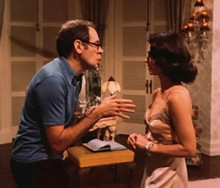 Loading... Please wait...
Loading... Please wait...New Products
Our Newsletter
Product Description
Cat On A Hot Tin Roof (1976)

Product Reviews
-
LAURENCE OLIVIER, NATALIE WOOD & ROBERT WAGNER IN AN UNCENSORED "CAT ON A HOT TIN ROOF"

Posted by DEWEY on Jan 11th 2024
Natalie Wood was obviously anxious to play a Tennessee Williams heroine. She got her big chance (after appearing in the 1966 film adaptation of Williams' one- act play "This Property Is Condemned") in this 1976 TV adaptation of the Pulitzer Prize winning "Cat On A Hot Tin Roof", under the banner title of "Laurence Olivier Presents", no less. Sir Olivier plays Big Daddy, and Wood's husband Robert Wagner plays Brick, the dissolute "favorite" son who would rather drink himself to death than continue living in a loveless marriage and toxic atmosphere of mendacity, avarice, and greed.
"Cat" had been filmed before in 1958, with its potent power toned down by censorship to the point of ridiculousness.
Big Daddy is 65 years old and dying of cancer. Everyone knows this; except Big Daddy himself, and his wife Ida, called Big Mama. Believing a false diagnosis, Big Daddy is determined to be King of his Kingdom once again.
Everyone is interested in what is and what is not happening in the bedroom of Brick and Maggie, where, since the death of Brick's college friend Skipper, sex has been replaced by alcohol, rage and recriminations. The mere suggestion of homosexual undercurrents between Brick and Skipper sends Brick into the most violent rages of all. Brick blames Maggie for Skipper's death, and treats her with a mixture of cold indifference and venomous contempt. Deep down, Brick knows he is also partially to blame for Skipper's death, and that's why he can't live with himself. Maggie is determined to save Brick from self-destruction, and to revive the sexual passion in her moribund marriage.
Maggie is supposed to have the survival instincts of a cat on a hot tin roof, but Natalie Wood can't deliver the anxieties, desperation, determination, or passion the role requires. Wood is up to the challenge, but one gets the feeling the director did not encourage her to really go for it! Wood is, as always, lovely, but she is too restrained here. By contrast, Maureen Stapleton is much too overwrought as Big Mama. Olivier and Wagner do achieve a nice dramatic balance, however, and sparks fly in their confrontational scenes together.
Next to Tennessee Williams' plays, what passes for "drama" today is merely cold and calculated artistic manipulation. The blunt force of Williams' dramas can still jolt audiences. When Williams died in 1983, the American Theatre lost its most humane interpreter of the complexities of the human condition.
Currency Converter
Choose a currency below to display product prices in the selected currency.
















